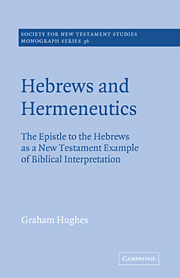 Hebrews and Hermeneutics
Hebrews and Hermeneutics Summary
The most immediately obvious expression of the hermeneutical question lying behind the epistle is contained in the use made by the writer of the Old Testament in his quotations. That is why almost invariably studies of the hermeneutical principles of the author have been confined to this particular field of investigation.
Attention has regularly been given to the singularly dynamic way in which the scriptures function for this Christian writer: ‘When he uses any word to introduce a quotation he employs words expressing diction … The present tense is preferred to the past tense, active forms to passive.’ ‘What has been said is also being said.’ In fact this observation simply raises in an especially clear and precise form the dialectic which we have said is the distinguishing mark of the relationship between the covenants. In this particular case the question takes the form: how in one context can the scriptures of the Old Testament function so immediately as a vehicle for the Word of God while in other contexts the covenant which those same scriptures enshrine is unceremoniously dismissed as outmoded?
It is true that we have to do here with the web of problems raised by the writer's citations from, and exegesis of, the Old Testament.
- Type
- Chapter
- Information
- Hebrews and HermeneuticsThe Epistle to the Hebrews as a New Testament Example of Biblical Interpretation, pp. 35 - 74Publisher: Cambridge University PressPrint publication year: 1980
